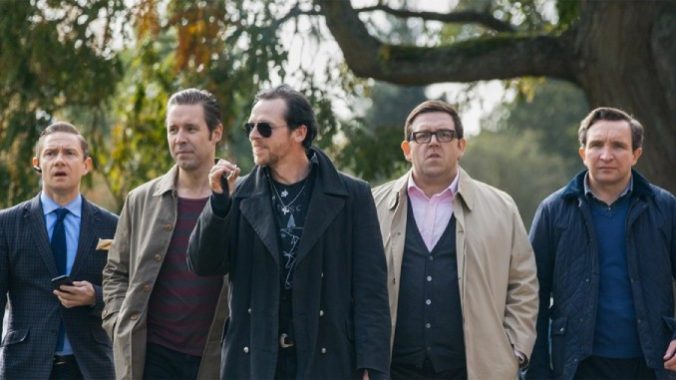10 Years Later, The World’s End Remains Edgar Wright’s Best Movie

“You can’t go home again.” It’s an expression meant to convey the futile attempt of trying to find emotional solace by returning to the place you once lived because, inevitably, it’s not that place anymore. Your old haunts become unrecognizable, neighbors and acquaintances move on with their lives or leave altogether, and the entire feel and texture of the town seem feigned, like a wholly different place masquerading as the setting that was once your home. But it’s you that’s changed too. The physical location could stay exactly the same and it’s still likely you wouldn’t find it quite the same—you’ve gotten older, your priorities are different, you have a family and a job, you’ve built out an entirely new life in your adulthood. You’re an entirely different person.
That is, unless you’re Gary King. The protagonist of The World’s End, the final entry in Edgar Wright’s Cornetto Trilogy, seemingly hasn’t changed a bit. He’s the same old reckless 17-year-old kid, trapped within the body of a 40-year-old. Played by Pegg, he wears the same Sisters of Mercy T-shirt, has the same greasy dyed-black hair, and fantasizes about the same night from over 20 years ago: An unsuccessful attempt by him and his shithead high school buddies (the adult versions of which are played by Nick Frost, Martin Freeman, Paddy Considine, and Eddie Marsan) to complete The Golden Mile, a raucous 12-location pub crawl in their hometown of Newton Haven.
Now in rehab, estranged from his friends and generally unsuccessful, Gary latches onto the idea that maybe you actually can go home again, and perhaps getting the gang together to finish out that fateful night would bring some sort of sense to his world. His myopic, self-destructive worldview will be the catalyst for his own self-actualization, but it’s also going to take the intervention of his friends, an alien robot invasion, and perhaps even the end of the civilized world. Through this, The World’s End becomes the most emotionally mature and resonant of any of Wright’s films, an existential crisis from an efficient purveyor of vibrant cinematic style. Ten years on, it continues to be his best movie.
Whereas the previous entries of this loosely-connected series had their outlines heavily defined by parody and homage, The World’s End finds its own distinct groove as the entry that isn’t indebted to one obvious filmmaker or genre in particular. The initial film Shaun of the Dead managed to carve out its own sense of identity outside the obvious joke of its title by taking a wry sense of humor, visual wit and potent emotion, and merging them with the sense of bleak, encroaching dread that defined the films of zombie master George Romero. Hot Fuzz is perhaps the most outright caricatural of the three, as well as the most exhaustively funny and gag-filled, its buddy-cop narrative in constant conversation with the likes of murder-mystery storytellers such as Agatha Christie and bombastic action-filmmaking auteurs like Michael Bay and Tony Scott.
-

-

-

-

-

-

-

-

-

-

-

-

-

-

-

-

-

-

-

-

-

-

-

-

-

-

-

-

-

-

-

-

-

-

-

-

-

-

-

-








































